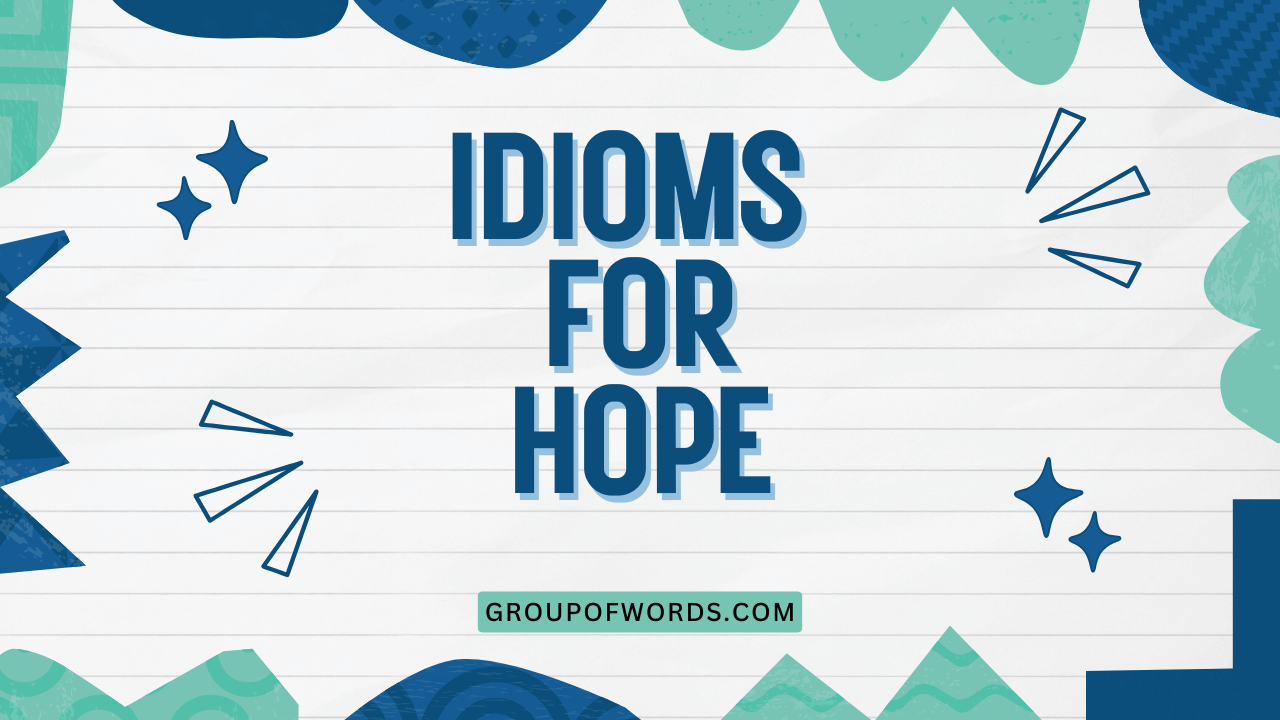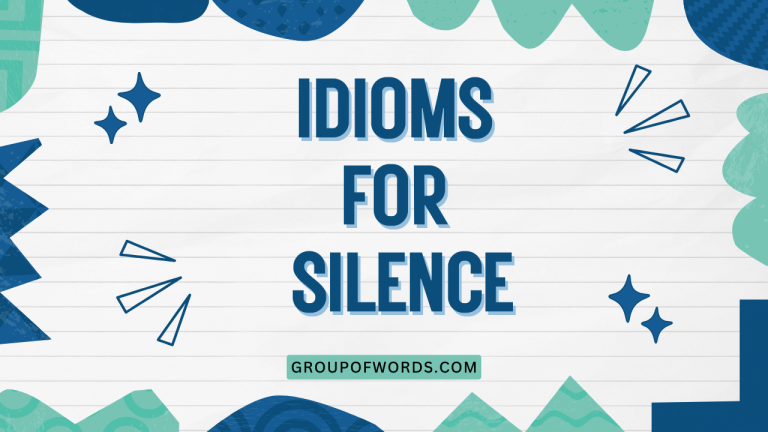Idioms for Hope: A Comprehensive Guide
Hope is a fundamental human emotion, and the English language is rich with idioms that capture its nuances. Understanding these idioms allows for more expressive and nuanced communication, whether in writing or speaking.
This article delves into the world of idioms related to hope, providing definitions, examples, and practical exercises to help you master their usage. This comprehensive guide is designed for English language learners of all levels, from beginners to advanced speakers, and anyone who wishes to enrich their vocabulary and improve their understanding of idiomatic expressions.
Table of Contents
- Introduction
- Definition of Idioms for Hope
- Structural Breakdown of Idioms
- Types and Categories of Hope Idioms
- Examples of Idioms for Hope
- Usage Rules for Idioms of Hope
- Common Mistakes with Hope Idioms
- Practice Exercises
- Advanced Topics in Hope Idioms
- Frequently Asked Questions
- Conclusion
Introduction
Idioms are an integral part of the English language, adding color, depth, and cultural context to communication. Mastering idioms, especially those related to emotions like hope, allows for a richer and more nuanced understanding of English.
This article provides a detailed exploration of idioms related to hope, covering their definitions, structural elements, variations, and usage rules. By studying this guide, you will be able to effectively use these idioms in your everyday conversations, writing, and comprehension of English literature and media.
Whether you are an English language learner or a native speaker seeking to refine your language skills, this article will serve as a valuable resource.
Definition of Idioms for Hope
An idiom is a phrase or expression whose meaning cannot be understood from the literal meanings of its individual words. Instead, it has a figurative meaning that is culturally specific. Idioms related to hope are phrases that express different aspects of this emotion, such as optimism, expectation, uncertainty, or delusion. They provide a concise and impactful way to convey complex feelings and situations related to hope.
The function of idioms for hope is to add emotional depth and cultural context to communication. They enable speakers and writers to express nuanced feelings about the future, expectations, and the possibility of positive outcomes.
Understanding these idioms requires familiarity with cultural references and the ability to interpret figurative language.
Idioms for hope can be used in a variety of contexts, including casual conversations, formal writing, literature, and media. They are particularly effective in situations where the speaker or writer wants to convey a sense of emotion or create a vivid image in the mind of the audience.
For example, instead of saying “I am optimistic about the future,” one might say “I see light at the end of the tunnel,” which is a more evocative and culturally resonant expression.
Structural Breakdown of Idioms
Idioms, by their nature, defy a simple structural analysis. They are often fixed expressions, meaning their individual words cannot be changed or rearranged without altering or destroying the idiom’s meaning.
However, understanding the common patterns and components can aid in comprehension.
Many idioms consist of a combination of nouns, verbs, adjectives, and prepositions. The specific arrangement of these elements contributes to the overall meaning of the idiom.
For example, in the idiom “keep your fingers crossed,” the verb “keep” combines with the possessive pronoun “your” and the noun phrase “fingers crossed” to create an expression of hope for good luck.
Some idioms may also contain metaphorical or symbolic elements. These elements contribute to the figurative meaning of the idiom and often reflect cultural beliefs or historical events.
For instance, the idiom “a ray of hope” uses the metaphor of a ray of light to symbolize a small but significant source of optimism in a dark or difficult situation. Recognizing these metaphorical elements can help learners understand the deeper meaning of the idiom.
Types and Categories of Hope Idioms
Idioms related to hope can be categorized based on the specific aspect of hope they express. Understanding these categories can help learners choose the most appropriate idiom for a given situation.
Idioms Expressing Positive Expectations
These idioms convey optimism and the belief that a favorable outcome is likely. They often involve imagery of light, progress, or success.
These idioms underscore a sense of confidence and anticipation of good things to come. They’re often used when someone feels assured that their efforts will lead to a positive result.
Idioms Expressing Tenuous or Fragile Hope
These idioms express a sense of uncertainty or vulnerability regarding the fulfillment of a hope. They often involve imagery of fragility, weakness, or doubt.
These idioms are useful when describing situations where hope exists, but is easily threatened or diminished by circumstances.
Idioms Expressing False Hope
These idioms describe situations where hope is misplaced or based on unrealistic expectations. They often involve imagery of deception, illusion, or disappointment.
These idioms help express the realization that what was once believed to be a promising possibility is, in fact, unlikely to materialize.
Idioms Expressing Sustaining Hope
These idioms focus on the act of maintaining or nurturing hope, often in the face of adversity. They emphasize resilience, perseverance, and the importance of not giving up.
These idioms highlight how hope can be a driving force, enabling individuals to endure challenges and continue striving towards their goals.
Examples of Idioms for Hope
The following tables provide examples of idioms for hope, categorized by the type of hope they express. Each example is accompanied by a definition and a sample sentence to illustrate its usage.
Positive Expectations Examples
This table illustrates idioms that convey a sense of optimism and the belief in a favorable outcome. Each idiom is defined, and a sample sentence demonstrates its use in context.
| Idiom | Definition | Example Sentence |
|---|---|---|
| See light at the end of the tunnel | Believe that a difficult situation is coming to an end. | After months of hard work, we can finally see light at the end of the tunnel. |
| Have high hopes | To be very optimistic about something. | We have high hopes for the success of the new project. |
| Look on the bright side | Focus on the positive aspects of a situation. | Even though we lost the game, let’s look on the bright side and focus on what we learned. |
| The sky’s the limit | There is no limit to what can be achieved. | With your talent and dedication, the sky’s the limit. |
| Every cloud has a silver lining | There is something positive to be found in every negative situation. | Even though you lost your job, remember that every cloud has a silver lining. |
| Keep your chin up | Remain cheerful in a difficult situation. | Keep your chin up; things will get better soon. |
| Hope springs eternal | Hope never dies, even in the face of adversity. | Despite the setbacks, hope springs eternal in his heart. |
| On the horizon | Likely to happen or appear soon. | With new investments on the horizon, the company’s future looks bright. |
| Golden opportunity | A very good chance to do something. | This job offer is a golden opportunity for him to advance his career. |
| A dream come true | Something that you have wanted for a long time has happened. | Winning the championship was a dream come true for the entire team. |
| In the cards | Likely to happen. | A promotion is in the cards for her if she continues to perform well. |
| Things are looking up | Situation is improving. | After a difficult year, things are finally looking up for the family. |
| A pot of gold at the end of the rainbow | Something that seems very attractive but is impossible to find or get. | He is chasing a pot of gold at the end of the rainbow with his unrealistic business plan. |
| New lease on life | An opportunity to start again or improve one’s life. | After recovering from his illness, he felt like he had a new lease on life. |
| Onwards and upwards | Moving forward to better things. | Despite the challenges, we are determined to move onwards and upwards. |
| See a brighter future | To envision a more positive outlook. | After implementing the new policies, we can see a brighter future for the company. |
| Everything’s coming up roses | Everything is going well. | Since she got the promotion, everything’s coming up roses for her. |
| Take heart | Be encouraged; don’t lose hope. | Take heart, the situation will improve with time. |
| The best is yet to come | The most positive or enjoyable period is still in the future. | They believe that the best is yet to come for their relationship. |
| Future is bright | The outlook is positive and filled with potential. | With her hard work and dedication, her future is bright. |
| A silver bullet | A simple and seemingly magical solution to a complicated problem. | There’s no silver bullet to solve the climate crisis, but renewable energy is a step in the right direction. |
| At the end of the rainbow | A situation that is hoped for but is nearly impossible to achieve. | Finding the perfect job felt like searching at the end of the rainbow. |
| Have faith | To believe strongly in something or someone. | Have faith that everything will work out in the end. |
| Hope for the best | To expect a positive outcome. | We can only hope for the best in this difficult situation. |
| The sun will shine again | Things will eventually improve after a difficult period. | Even though things are tough now, remember that the sun will shine again. |
Tenuous or Fragile Hope Examples
The following table showcases idioms that depict a sense of uncertainty or vulnerability regarding the fulfillment of hope. These expressions highlight the delicate nature of hope in challenging circumstances.
| Idiom | Definition | Example Sentence |
|---|---|---|
| Keep your fingers crossed | Hope for good luck. | I have an interview tomorrow, so keep your fingers crossed for me. |
| A glimmer of hope | A small sign of hope. | After the rescue team found survivors, there was a glimmer of hope that more people would be saved. |
| Clutching at straws | Trying anything to find a solution, even if it is unlikely to succeed. | With no other options left, they were clutching at straws to save the company. |
| Hanging by a thread | In a very precarious or unstable situation. | The patient’s life was hanging by a thread after the surgery. |
| Build castles in the air | To have unrealistic or impractical dreams or plans. | He was building castles in the air with his plans to become a famous actor overnight. |
| Don’t count your chickens before they hatch | Don’t be too confident that something will be successful before it actually happens. | We should wait for the final results before celebrating; don’t count your chickens before they hatch. |
| A shot in the dark | An attempt that has little chance of success. | Applying for the scholarship was a shot in the dark, but I decided to try anyway. |
| Walking on eggshells | Being very careful not to offend or upset someone. | Ever since the argument, I feel like I’m walking on eggshells around her. |
| On tenterhooks | In a state of suspense or agitation because of uncertainty about a future event. | We were kept on tenterhooks waiting for the test results. |
| Waiting with bated breath | Waiting anxiously or excitedly. | The audience was waiting with bated breath for the announcement of the winner. |
| A long shot | Something that has a very low probability of success. | Winning the lottery is a long shot, but people still buy tickets. |
| Skating on thin ice | Being in a risky or dangerous situation. | He’s skating on thin ice with his constant tardiness. |
| In the balance | In an uncertain state; undecided. | The fate of the project is still in the balance. |
| Touch and go | With an uncertain outcome. | The surgery was touch and go, but the patient is now recovering. |
| Hope against hope | To continue to hope even when there is little or no reason to do so. | They were hoping against hope that their missing child would be found safe. |
| A faint hope | A very small or weak hope. | There is still a faint hope that they will reach an agreement. |
| Living on a prayer | Relying on hope when the situation seems hopeless. | After losing their home, they were living on a prayer. |
| Cross that bridge when you come to it | Deal with a problem if and when it becomes necessary, not before. | Let’s not worry about potential problems; we’ll cross that bridge when we come to it. |
| Holding thumbs | Wishing someone good luck. (Similar to “keep your fingers crossed,” common in some regions) | I’m holding thumbs for you for your job interview. |
| Walking a tightrope | Being in a situation where one wrong move could have serious consequences. | He’s walking a tightrope trying to balance work and family responsibilities. |
| A fragile dream | A hope that is easily shattered. | Their plans for a new business were a fragile dream that quickly faded. |
| Papering over the cracks | Concealing problems temporarily rather than solving them. | The new policies are just papering over the cracks in the company’s financial issues. |
| Whistling in the dark | Trying to stay cheerful in a frightening or difficult situation. | He was whistling in the dark, trying to act confident despite his fears. |
| A distant prospect | Something that is unlikely to happen soon. | Retirement is still a distant prospect for many young workers. |
| A house of cards | A plan or system that is very weak and could easily fail. | Their business empire turned out to be a house of cards. |
False Hope Examples
This table presents idioms that describe situations where hope is misplaced or based on unrealistic expectations. These expressions highlight the disappointment that can arise from unfounded optimism.
| Idiom | Definition | Example Sentence |
|---|---|---|
| Chase rainbows | Pursue unrealistic or unattainable goals. | He’s chasing rainbows if he thinks he can become a millionaire overnight. |
| A fool’s paradise | A state of happiness based on false beliefs or ignorance. | They were living in a fool’s paradise, unaware of the financial troubles ahead. |
| Barking up the wrong tree | Pursuing a mistaken or misguided course of action. | If you think he’s the thief, you’re barking up the wrong tree. |
| A pie in the sky | A promise or hope that is unrealistic or unlikely to be fulfilled. | Their plans for colonizing Mars are just pie in the sky. |
| Grasping at straws | Desperately trying anything to find a solution, even if it is unlikely to succeed. | The company was grasping at straws to avoid bankruptcy. |
| Clinging to a delusion | Holding onto a false belief despite evidence to the contrary. | He was clinging to a delusion that his ex-girlfriend would come back. |
| False dawn | A situation in which something seems to be improving, but then fails. | The brief economic recovery turned out to be a false dawn. |
| Leading someone up the garden path | Deceiving someone in order to get something from them. | The salesman led him up the garden path with promises of quick profits. |
| Selling someone a pup | To deceive someone by selling them something worthless or defective. | He realized he had been sold a pup when the car broke down the next day. |
| A mirage in the desert | Something that appears to be real but is not. | The promise of easy money was just a mirage in the desert. |
| A fool’s errand | A task that has no hope of success. | Searching for the missing document was a fool’s errand. |
| Putting all your eggs in one basket | Risking everything on a single venture. | Investing all his savings in one company was putting all his eggs in one basket. |
| A castle built on sand | Something that appears strong but is actually weak and likely to collapse. | Their relationship was a castle built on sand, destined to crumble. |
| Chasing windmills | Wasting time and energy on something that is impossible to achieve. | He’s chasing windmills trying to change the company’s outdated policies. |
| A pipe dream | An unrealistic hope or plan that is unlikely to succeed. | Her ambition to become a famous singer was just a pipe dream. |
| A fool’s gold | Something that appears valuable but is actually worthless. | The investment opportunity turned out to be fool’s gold. |
| A fool’s game | An activity that is pointless or likely to fail. | Trying to predict the stock market is a fool’s game. |
| Deluding yourself | Making yourself believe something that is not true. | He was deluding himself if he thought he could win the race without training. |
| Living in denial | Refusing to accept the truth about something. | She was living in denial about her addiction. |
| A fool’s bargain | An agreement that is advantageous to only one party. | Accepting the contract was a fool’s bargain. |
| A false sense of security | A feeling of safety that is not justified. | The alarm system gave them a false sense of security. |
| Gilding the lily | Trying to improve something that is already beautiful or perfect. | Adding more features to the app would be like gilding the lily. |
| A fool and his money are soon parted | Foolish people tend to lose their money quickly. | He lost all his savings in a bad investment; a fool and his money are soon parted. |
| Holding onto a lost cause | Continuing to support something that is certain to fail. | They were holding onto a lost cause by trying to revive the failing business. |
| A fool’s paradise | A state of happiness based on false beliefs or ignorance. | They were living in a fool’s paradise, unaware of the financial troubles ahead. |
Sustaining Hope Examples
The table below provides idioms that focus on the act of maintaining or nurturing hope, often in the face of adversity. These expressions emphasize resilience, perseverance, and the importance of not giving up.
| Idiom | Definition | Example Sentence |
|---|---|---|
| Keep the faith | Continue to believe in something, even when things are difficult. | Keep the faith; things will eventually get better. |
| Hold on | To persevere or endure a difficult situation. | Just hold on a little longer; help is on the way. |
| Never say die | Never give up; keep trying. | They never say die, even when faced with overwhelming odds. |
| Keep your hopes up | Remain optimistic and hopeful. | Keep your hopes up; you never know what might happen. |
| Carry the torch | To continue a tradition or belief. | She is determined to carry the torch for her family’s values. |
| Keep the home fires burning | Maintain a sense of hope and stability during difficult times. | While he was away at war, she kept the home fires burning. |
| Look forward to | Anticipate something with pleasure. | We are looking forward to the holidays. |
| Hold out hope | Continue to hope, even when the situation seems bleak. | They are still holding out hope that their missing pet will be found. |
| Weather the storm | Survive a difficult period. | The company managed to weather the storm and emerge stronger. |
| Ride out the storm | Endure a difficult situation until it passes. | We just need to ride out the storm and things will improve. |
| Hang in there | To persevere or remain strong during a difficult time. | Hang in there; it will get easier. |
| Keep plugging away | To continue working hard despite difficulties. | He kept plugging away at his studies, even when he felt discouraged. |
| Stick it out | To persevere to the end of a difficult situation. | They decided to stick it out and see if things would improve. |
| Keep going | To continue moving forward despite obstacles. | Keep going; you’re almost there. |
| Press on | To continue with determination. | Despite the setbacks, they pressed on with their plans. |
| Maintain optimism | To keep a positive outlook. | It’s important to maintain optimism in the face of challenges. |
| Persevere through adversity | To continue striving despite difficulties. | They persevered through adversity and achieved their goals. |
| Keep your spirits up | Stay cheerful and positive. | Keep your spirits up; things will get better. |
| Look to the future | Focus on what is to come. | We should look to the future with hope and determination. |
| Maintain a positive attitude | To keep a positive mindset. | Maintaining a positive attitude is essential for success. |
| Never lose hope | To never give up believing in a positive outcome. | Never lose hope, even in the darkest times. |
| Hold fast to your dreams | Keep your dreams alive and pursue them relentlessly. | Hold fast to your dreams, no matter what. |
| Stand your ground | To defend your position or beliefs. | Stand your ground and don’t let anyone discourage you. |
| Endure to the end | To persist until the final outcome. | We must endure to the end and see our vision realized. |
| Keep a stiff upper lip | To remain brave and unemotional in the face of adversity. | He kept a stiff upper lip despite the bad news. |
Usage Rules for Idioms of Hope
Using idioms correctly requires understanding their specific meanings and contexts. Here are some general rules to follow when using idioms for hope:
- Use idioms in appropriate contexts: Consider the audience and the situation when using idioms. Some idioms may be too informal for formal settings.
- Understand the nuances of meaning: Idioms often have subtle differences in meaning. Choose the idiom that best conveys the specific nuance you want to express.
- Avoid mixing idioms: Mixing idioms can create confusing or nonsensical expressions. Stick to one idiom at a time.
- Pay attention to grammar: Idioms often have specific grammatical structures. Use the correct verb tenses and word order.
- Be aware of regional variations: Some idioms may be more common in certain regions or countries. Use idioms that are appropriate for your audience.
It’s crucial to remember that idioms are fixed expressions. Altering the words or their order can change the meaning or make the idiom incomprehensible.
For example, saying “See the light at the end of the road” instead of “See light at the end of the tunnel” would not convey the intended meaning.
Common Mistakes with Hope Idioms
One of the most common mistakes is taking idioms literally. For example, someone might misunderstand “keep your fingers crossed” to mean literally crossing one’s fingers, rather than hoping for good luck.
This can lead to confusion and miscommunication.
Another common mistake is using idioms out of context. For instance, using an idiom that expresses tenuous hope in a situation that calls for positive expectation can sound inappropriate or even sarcastic.
It’s important to choose idioms that align with the emotional tone of the situation.
Here are some examples of common mistakes and their corrections:
| Incorrect | Correct | Explanation |
|---|---|---|
| I see the light at the end of the road. | I see light at the end of the tunnel. | “Light at the end of the tunnel” is the correct idiom. |
| We have big hopes for the project. | We have high hopes for the project. | “High hopes” is the correct idiom. |
| Don’t count your chickens before they are born. | Don’t count your chickens before they hatch. | “Hatch” is the correct word in this idiom. |
| I’m holding thumbs for you. | I’m keeping my fingers crossed for you. | “Keeping my fingers crossed” is more common in some regions, while “holding thumbs” is used in others. |
| They were running for a delusion. | They were clinging to a delusion. | “Clinging to” is the correct verb in this idiom. |
Practice Exercises
Test your understanding of idioms for hope with these practice exercises.
Exercise 1: Fill in the Blanks
Choose the correct idiom from the list to complete each sentence:
- See light at the end of the tunnel
- Keep your fingers crossed
- Look on the bright side
- Chasing rainbows
- Keep the faith
| Question | Answer |
|---|---|
| 1. After months of hard work, we can finally __________. | See light at the end of the tunnel |
| 2. I have an interview tomorrow, so __________. | Keep your fingers crossed |
| 3. Even though we lost the game, let’s __________ and focus on what we learned. | Look on the bright side |
| 4. He’s __________ if he thinks he can become a millionaire overnight. | Chasing rainbows |
| 5. __________; things will eventually get better. | Keep the faith |
| 6. Despite the initial setbacks, they could __________ for their company’s future. | See light at the end of the tunnel |
| 7. We are __________ that the new treatment will be effective. | Keeping our fingers crossed |
| 8. Even though the situation is difficult, try to __________ and remember what we’ve accomplished. | Look on the bright side |
| 9. She is __________ if she believes she can succeed without any effort. | Chasing rainbows |
| 10. No matter how challenging things get, always __________. | Keep the faith |
Exercise 2: Matching
Match the idiom with its correct definition:
| Idiom | Definition | Answer |
|---|---|---|
| 1. A glimmer of hope | A. Pursue unrealistic goals | 1. B |
| 2. Chase rainbows | B. A small sign of hope | 2. A |
| 3. A fool’s paradise | C. Being in a risky situation | 3. D |
| 4. Skating on thin ice | D. A state of happiness based on false beliefs | 4. C |
| 5. Never say die | E. To endure a difficult period. | 5. F |
| 6. Weather the storm | F. Never give up. | 6. E |
| 7. A shot in the dark | G. Waiting anxiously. | 7. H |
| 8. Waiting with bated breath | H. An attempt that has little chance of success. | 8. G |
| 9. Building castles in the air | I. To have unrealistic or impractical dreams or plans. | 9. I |
| 10. Things are looking up | J. Situation is improving. | 10. J |
Exercise 3: Multiple Choice
Choose the best idiom to complete the sentence:
| Question | Options | Answer |
|---|---|---|
| 1. After the surgery, the patient’s life was __________. | A. a pot of gold, B. hanging by a thread, C. a new lease on life, D. onwards and upwards | B. hanging by a thread |
| 2. Winning the championship was __________ for the entire team. | A. a dream come true, B. in the cards, C. things are looking up, D. a glimmer of hope | A. a dream come true |
| 3. Despite the challenges, we are determined to move __________. | A. a long shot, B. a house of cards, C. onwards and upwards, D. selling someone a pup | C. onwards and upwards |
| 4. After recovering from his illness, he felt like he had __________. | A. a new lease on life, B. a faint hope, C. a distant prospect, D. skating on thin ice | A. a new lease on life |
| 5. She is __________ if she believes she can succeed without any effort. | A. touching and go, B. chasing rainbows, C. maintaining optimism, D. keeping the faith | B. chasing rainbows |
Advanced Topics in Hope Idioms
For advanced learners, exploring the historical and cultural origins of hope idioms can provide deeper insights into their meanings and usage. Many idioms have roots in historical events, literature, or folklore.
Analyzing the use of hope idioms in literature and media can also enhance understanding and appreciation. Authors and speakers often use idioms to add emotional depth, convey cultural context, and create vivid imagery.
Examining how idioms are used in different genres and styles can provide valuable lessons for effective communication.
Additionally, comparing hope idioms across different languages can reveal interesting cultural differences and similarities. While some idioms may have direct equivalents in other languages, others may be unique to a particular culture.
Exploring these linguistic variations can broaden one’s understanding of hope as a universal human emotion.
Frequently Asked Questions
What is the difference between an idiom and a proverb?
An idiom is a phrase whose meaning cannot be understood from the literal meanings of its individual words, while a proverb is a short, well-known saying that expresses a general truth or piece of advice.
How can I improve my understanding of idioms?
Read widely, listen to native speakers, and pay attention to the context in which idioms are used. Practice using idioms in your own writing and speaking.
Are idioms used in formal writing?
Some idioms are appropriate for formal writing, while others are more informal. Consider your audience and the tone of your writing when choosing idioms.
Can idioms be translated directly into other languages?
Some idioms have direct equivalents in other languages, while others do not. It’s important to understand the cultural context of an idiom before attempting to translate it.
Why are idioms important for language learners?
Idioms add color, depth, and cultural context to communication. Understanding idioms allows for a richer and more nuanced understanding of the English language.
How do I avoid using idioms incorrectly?
Study the meanings and usage rules of idioms carefully. Pay attention to the context in which idioms are used, and practice using them in your own writing and speaking.
Conclusion
Mastering idioms for hope is a valuable skill for anyone seeking to improve their English language proficiency. By understanding the definitions, structures, and usage rules of these idioms, learners can communicate more effectively and expressively.
This article has provided a comprehensive guide to idioms for hope, covering various categories, examples, and practice exercises. With continued study and practice, you can confidently use these idioms in your everyday conversations, writing, and comprehension of English literature and media.
Embrace the richness and depth of the English language, and let your hope shine through your words.






